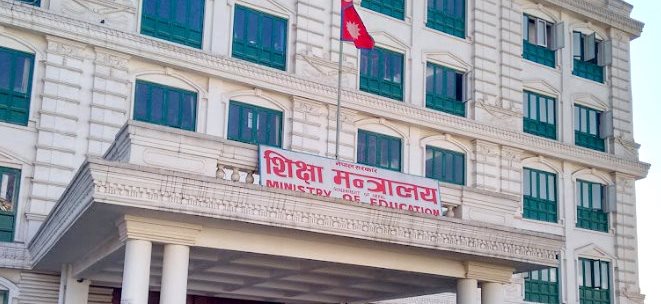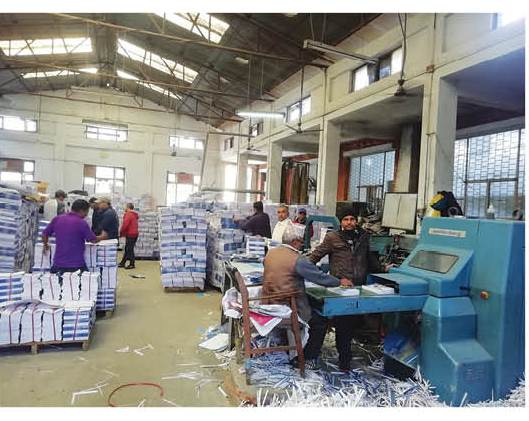Surge in gadget use: Brighter side of the pandemic

By Manjima Dhakal
Kathmandu, Jan. 7: While the COVID-19-induced lockdown has adversely affected virtually all sectors throughout the country, it has had a silver lining in one critically important sector: education.
The crisis has come as a boon for education sector as learning virtually has found widespread adoption. To make things sweeter, it has been found to be more effective than traditional methods of both teaching and learning, in most of the cases.
Teachers, guardians and students who previously had no idea even about how to open handy software tools like Google, Viber, Gmail, Zoom, Messenger, etc., have not only learned to open them, but are now proficient at using them, and this knowhow has enhanced their productivity, bolstering their confidence.
Although virtual learning has been unfolded opportunities for learning and accessing the brave new world of knowledge, it has highlighted the divide between the classes who have it all and those who don’t. That is to say, the poor families who can’t afford to buy laptops, mobile phones or internet connection have been left behind.
In other words, that has accentuated the digital divide, which was already there even before the pandemic hit.
Children from well-to-do families can afford everything, but for those from the bottom of the economic ladder, it is a distant dream. As a result, many children from the latter background have been deprived of basic education, let alone advanced education. And this is especially true for the pupils enrolled in government schools rather than private ones. Unable to attend schools, children there have no other option but to kill their time -- the damage it causes can be irreparable.
Rima Shrestha, a guardian of a fourth-grader enrolled in a private school in Kathmandu, said she had learned new skills like opening an email, along with various application softwares, and that since her daughter attends her classes virtually, it has improved the overall efficiency as alongside their children, guardians can participate in the virtual classes, observing each and every thing involved therein.
However, the story of Sita Tamang, a mother of eighth-grader enrolled in a community school, is starkly different. Mother of three, she, together with her family, has been living hands to mouth working as a maid at various houses in Kathmandu. Sharing her bitter experience of lockdown, she said that her children are not getting a chance to join virtual classes for lack of smartphones and internet connection. To make matters even worse, she has been losing one job after another. Fearing coronavirus transmission, her employers have asked her not to come to work.
Commenting on the recent upsurge of technology adoption in education sector, D.K. Dhungana, co-chair of Private and Boarding School Organisation Nepal (PABSON), said that academic sector’s rapid rather than planned application of technology had aggravated the problem of digital divide. “The sudden access to hitherto off-limit world, especially non-academic, has opened up so many avenues of distractions for pupils and their parents alike, due to which it has become harder for parents to guide their munchkins,” he said, suggesting that the new phenomenon was fraught with risks.
Dr. Biddhyanath Koirala, an educationist, said on the one hand, virtual learning had become boon for haves; on the other, bane for haves-not, and that there were not as many benefits of virtual learning as purported, since many teachers and guardians lack sufficient enthusiasm to join the bandwagon of virtual learning and teaching.
According to Computer Association of Nepal (CAN), the use of technology has increased by around 30 per cent during the lockdown period. Sales of laptops, mobiles, along with their accessories, have increased significantly during the last eight months,” said Nawaraj Kunwar, chairperson of CAN.
Recent News

Do not make expressions casting dout on election: EC
14 Apr, 2022
CM Bhatta says may New Year 2079 BS inspire positive thinking
14 Apr, 2022
Three new cases, 44 recoveries in 24 hours
14 Apr, 2022
689 climbers of 84 teams so far acquire permits for climbing various peaks this spring season
14 Apr, 2022
How the rising cost of living crisis is impacting Nepal
14 Apr, 2022
US military confirms an interstellar meteor collided with Earth
14 Apr, 2022
Valneva Covid vaccine approved for use in UK
14 Apr, 2022
Chair Prachanda highlights need of unity among Maoist, Communist forces
14 Apr, 2022
Ranbir Kapoor and Alia Bhatt: Bollywood toasts star couple on wedding
14 Apr, 2022
President Bhandari confers decorations (Photo Feature)
14 Apr, 2022









